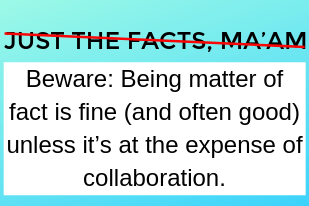by Andrea Howe | May 6, 2019 | Monthly-ish tips
This post is part of our Weekly Tips series.

Last week’s tip about shifting out of “order-taker” role got me thinking about a telling experience I once had with a tech support person. He fell into a classic trap, which I’m now sharing with you because it’s one we’re all vulnerable to.
by Andrea Howe | Apr 29, 2019 | Monthly-ish tips
This post is part of our Weekly Tips series.
A few tips ago I wrote about why it’s critical, as a services professional, to see your own value as more than just a trusted problem-solver. I shared the four levels of relationship as a framework to help. Recently, I’ve been revisiting a variation of that model that a colleague and I created specifically for anyone in a shared services (or internal consulting) role. It provides a way to re-think your value, and find proactive ways to consistently be seen as more than just an order taker.
by Andrea Howe | Apr 22, 2019 | Monthly-ish tips
This post is part of our Weekly Tips series.
If you’re suffering from Spring Fever like I am, you probably can’t tolerate anything too heavy or serious right now. So, this week I’m offering up a humorous (albeit poignant) example of a trust-building way to deliver a tough message.
by Andrea Howe | Apr 15, 2019 | Monthly-ish tips
This post is part of our Weekly Tips series.
Last week’s tip about the value of candor when you’ve screwed up triggered another walk down memory lane, to a time shortly before Charlie Green and I joined forces, when a colleague’s courageous admission taught me an unexpected lesson about trust-building.
Join me as we roll the clocks back.
by Andrea Howe | Apr 8, 2019 | Monthly-ish tips
This post is part of our Weekly Tips series.
Something recently made me think about a check I bounced about a gazillion years ago. (Some of you might actually remember the days of writing checks.) Reflecting on the situation and how I handled it then, I see two important trust-building lessons worth featuring today.
by Andrea Howe | Apr 1, 2019 | Monthly-ish tips
This post is part of our Weekly Tips series.
We can all benefit from learning how to be found a smidge more charming by clients, even the humblest of introverts among us. Not in a disingenuous way, of course, but in a way that creates an immediate and meaningful connection. This Weekly Tip gives you an unexpected insight into how to do that—one that’s also surprisingly palatable and easy.
by Andrea Howe | Mar 25, 2019 | Monthly-ish tips
This post is part of our Weekly Tips series.
Every once-in-a-while, Charlie Green and I are in the same place at the same time. I recently got to hear him speak at a DC-area event, and a conversation with an attendee reminded me of a simple yet critical lesson. This one applies to at least three kinds of client communications, including how you write your proposals.
by Andrea Howe | Mar 20, 2019 | Webinar
May 21, 2019
@11am ET
You’ve heard the admonition “Always be closing” or “ABC”. Here’s the unconventional wisdom: If you’re focused on closing then you are actually hurting your sales.
The simple truth is: closing is not buyer-centric–it’s seller-centric. And all of us as buyers know what it feels like to have another person try to force their will on us—and deny it’s happening even while they’re doing it.
In this TrustMatters webinar (live date: May 21, 2019 at 11am ET), we show you why closing is harmful and what you should be doing instead, including four best-practices to help you stop closing and start selling the trust-based way.

by Andrea Howe | Mar 18, 2019 | Monthly-ish tips
This post is part of our Weekly Tips series.
Last week’s tip focused on what I’ve recently come to call “micro-moments,” and how you train yourself to respond in them. I included concrete suggestions for the most trustworthy responses in two scenarios. This week, I add two more.
by Andrea Howe | Mar 11, 2019 | Monthly-ish tips
This post is part of our Weekly Tips series.
Charlie Green and his The Trusted Advisor co-authors assert that trust is often built with small gestures. Building on that theme, consider the importance of what I’ve recently come to call “micro-moments,” and how you train yourself to respond in them.



